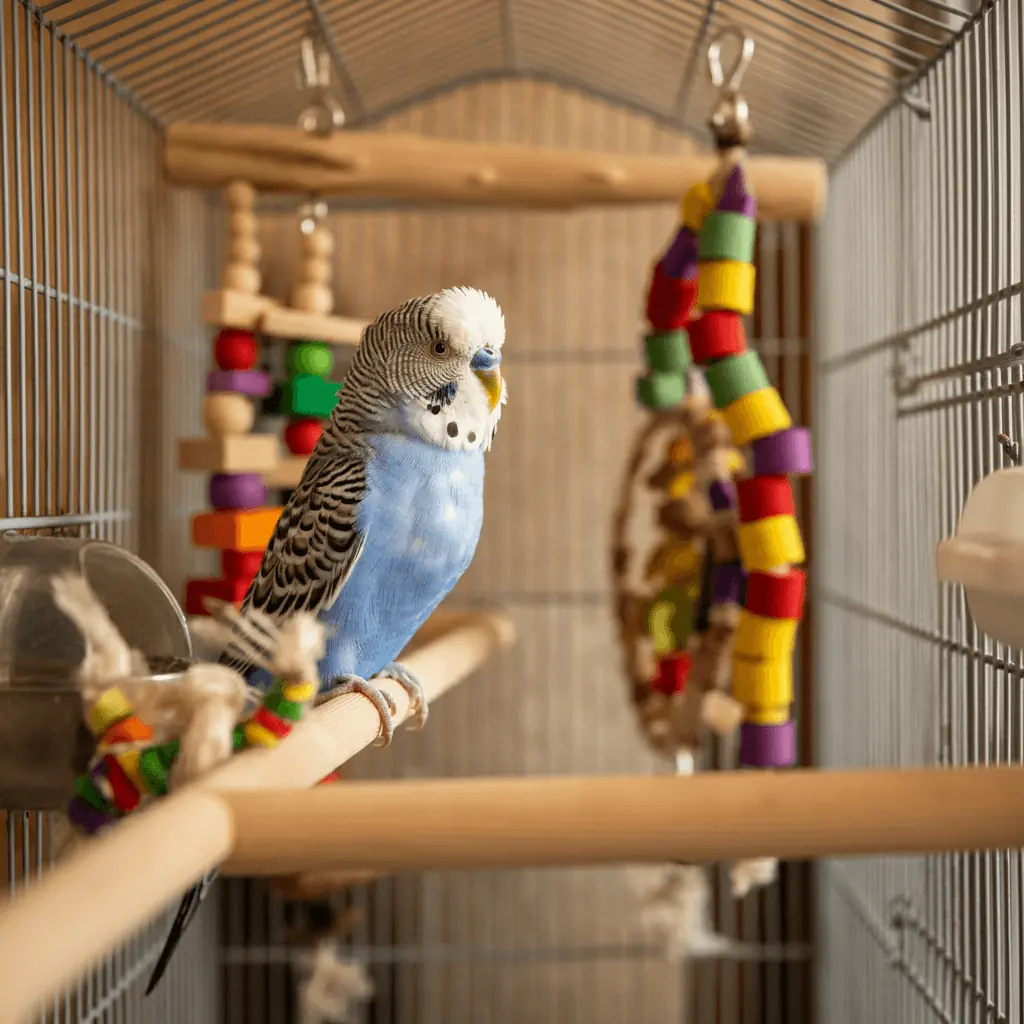What is Budgerigar Feather Plucking?
Budgerigar feather plucking is a behavioral issue where your budgie starts pulling out its own feathers. While it’s normal for birds to preen and shed feathers occasionally, excessive plucking is a sign that something is wrong. If left untreated, feather plucking can lead to bald patches, skin irritation, and even self-mutilation.
This behavior can be caused by a variety of factors, ranging from boredom and stress to underlying health problems. Budgies are highly social and intelligent birds, and when they don’t receive enough mental stimulation or attention, they may resort to destructive behaviors like feather plucking. Additionally, poor diet, skin infections, or parasites could also be contributing to your bird’s discomfort.
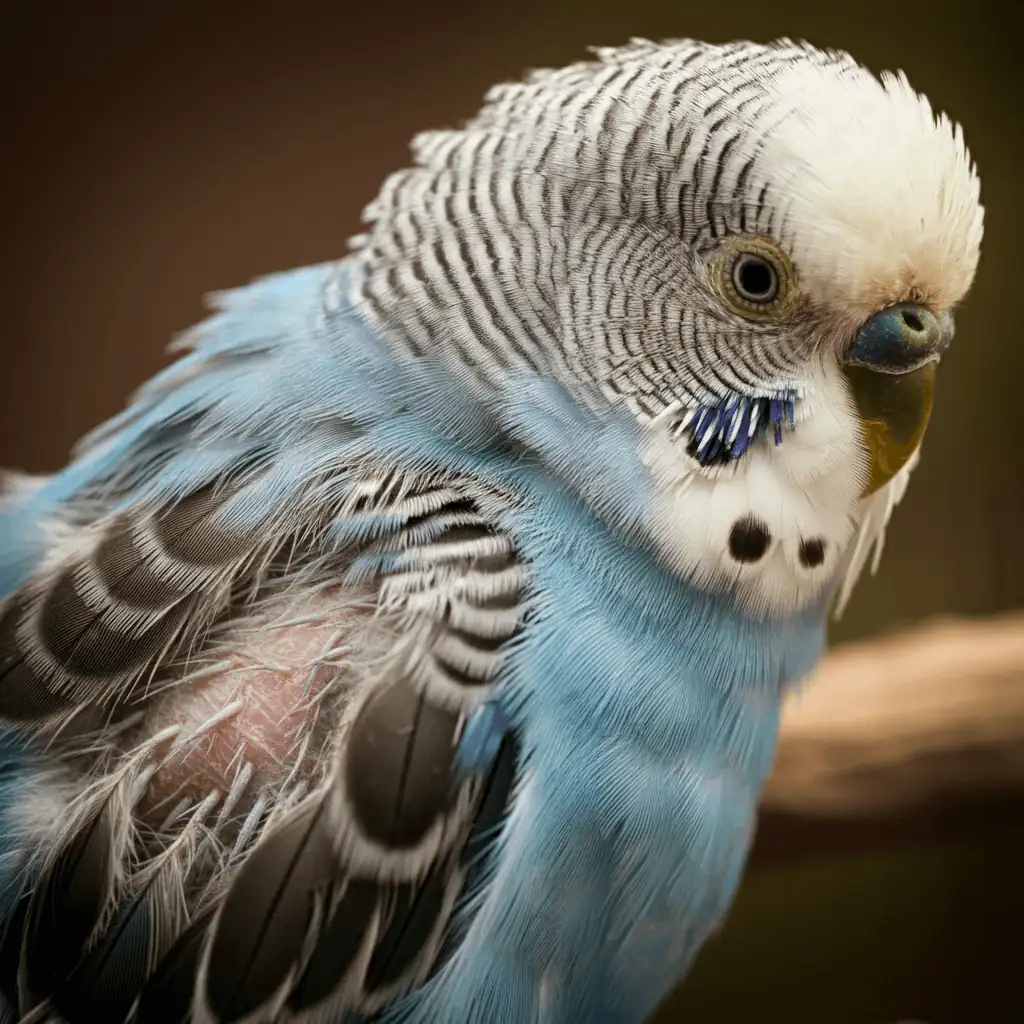
A close-up of a budgerigar showing missing feathers, a common sign of feather plucking that requires attention and care.
It’s important to recognize the early signs of budgie feather plucking before the issue worsens. Identifying and addressing the root cause quickly will help keep your budgie healthy and happy, preventing further damage to its feathers and overall well-being. If you notice your budgie biting or pulling its feathers frequently, it’s time to take action and seek out solutions.
Common Causes of Budgerigar Feather Plucking
Budgerigar feather plucking can stem from several different causes, and understanding these will help you prevent or stop this behavior in your bird. While it might seem alarming to see your budgie pulling out its own feathers, the issue is often linked to physical or emotional stress. Here are the most common reasons why budgies pluck their feathers:
1. Boredom and Lack of Stimulation
Budgies are intelligent and active birds that need plenty of mental and physical stimulation. A lack of toys, interaction, or things to do can lead to boredom, causing your budgie to engage in feather plucking as a way to cope. Providing a variety of toys and regularly interacting with your bird can make a huge difference.
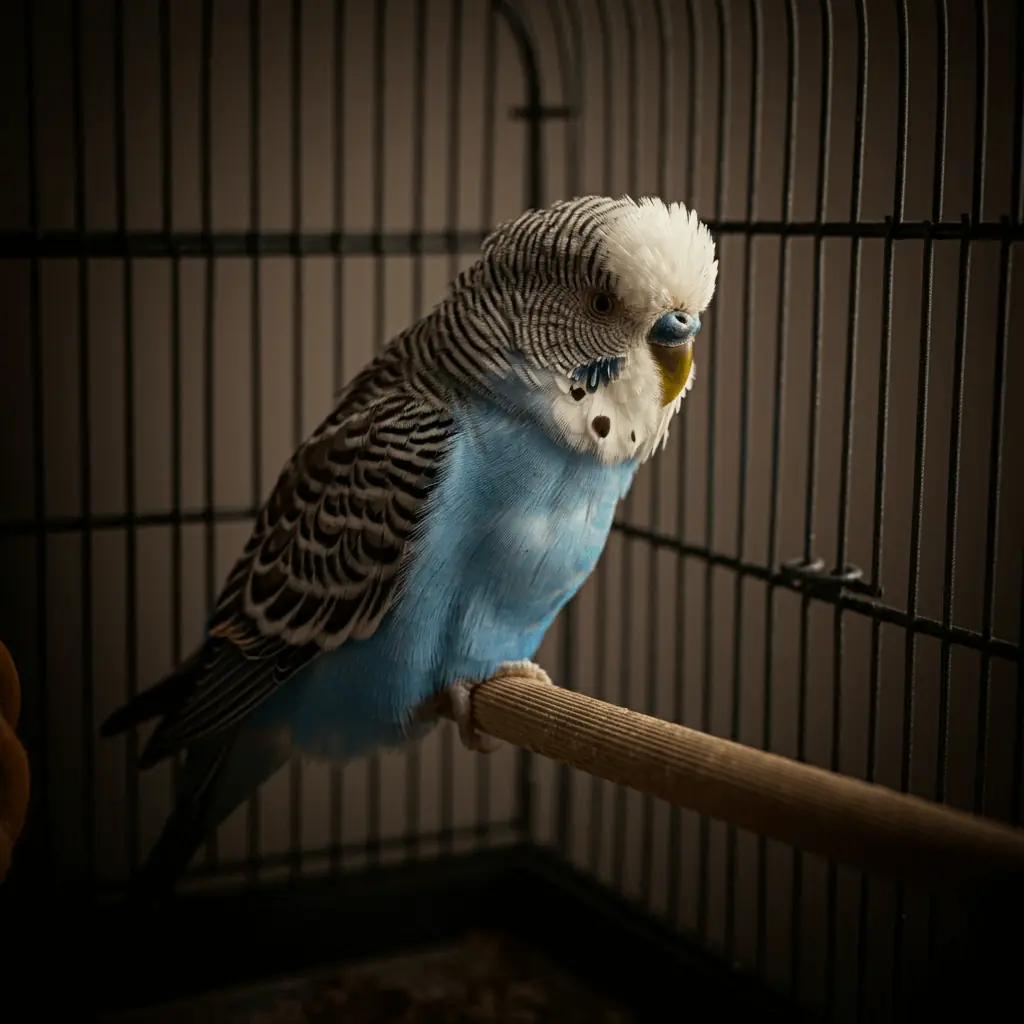
A budgerigar in an empty cage without any toys or enrichment, which may lead to feather plucking due to boredom and stress.
2. Stress and Anxiety
A stressed budgie is more likely to start plucking its feathers. Changes in the environment, such as moving their cage, loud noises, or even the introduction of a new pet, can trigger anxiety. Budgies are sensitive creatures, so it’s important to maintain a calm and stable environment for them.
3. Poor Diet
A nutrient-deficient diet can cause health problems that lead to feather plucking. Budgies require a balanced diet rich in vitamins and minerals to maintain healthy feathers. If they’re missing key nutrients like Vitamin A, calcium, or protein, feather plucking may result as their body struggles to maintain feather health.
4. Skin Irritations or Parasites
Physical discomfort like skin infections or mites can make your budgie feel itchy or irritated, leading to feather plucking. If you notice your bird is particularly focused on plucking in one area, it might be dealing with an underlying skin issue or parasite infestation that requires immediate attention.
5. Hormonal Imbalances
During breeding season, some budgies experience hormonal changes that can lead to behavioral shifts, including feather plucking. This is more common in birds kept indoors with artificial lighting, as it can disrupt their natural biological rhythms.
6. Lack of Social Interaction
Budgies are social birds that thrive on interaction. If left alone for long periods, they can become lonely and anxious, which may manifest in feather plucking. Spending time with your budgie and considering a companion bird can alleviate this issue.
Understanding these common causes of feather plucking is the first step to helping your budgie overcome this behavior. Identifying the root cause allows you to take the necessary steps to address the issue and keep your feathered friend healthy and happy.
How to Prevent Budgerigar Feather Plucking
Preventing budgerigar feather plucking requires understanding the root causes and creating an environment that keeps your budgie both mentally and physically healthy. With a few key adjustments, you can significantly reduce the chances of feather plucking and ensure your budgie remains happy.
1. Provide Mental Stimulation
One of the primary causes of budgerigar feather plucking is boredom. Budgies are intelligent birds that need activities to keep their minds occupied. Make sure to offer a variety of toys, puzzles, and perches in their cage. Rotate toys regularly to keep things fresh and exciting. Spending quality time with your budgie, teaching them tricks, or allowing them supervised flight time outside the cage can also prevent boredom-related plucking.
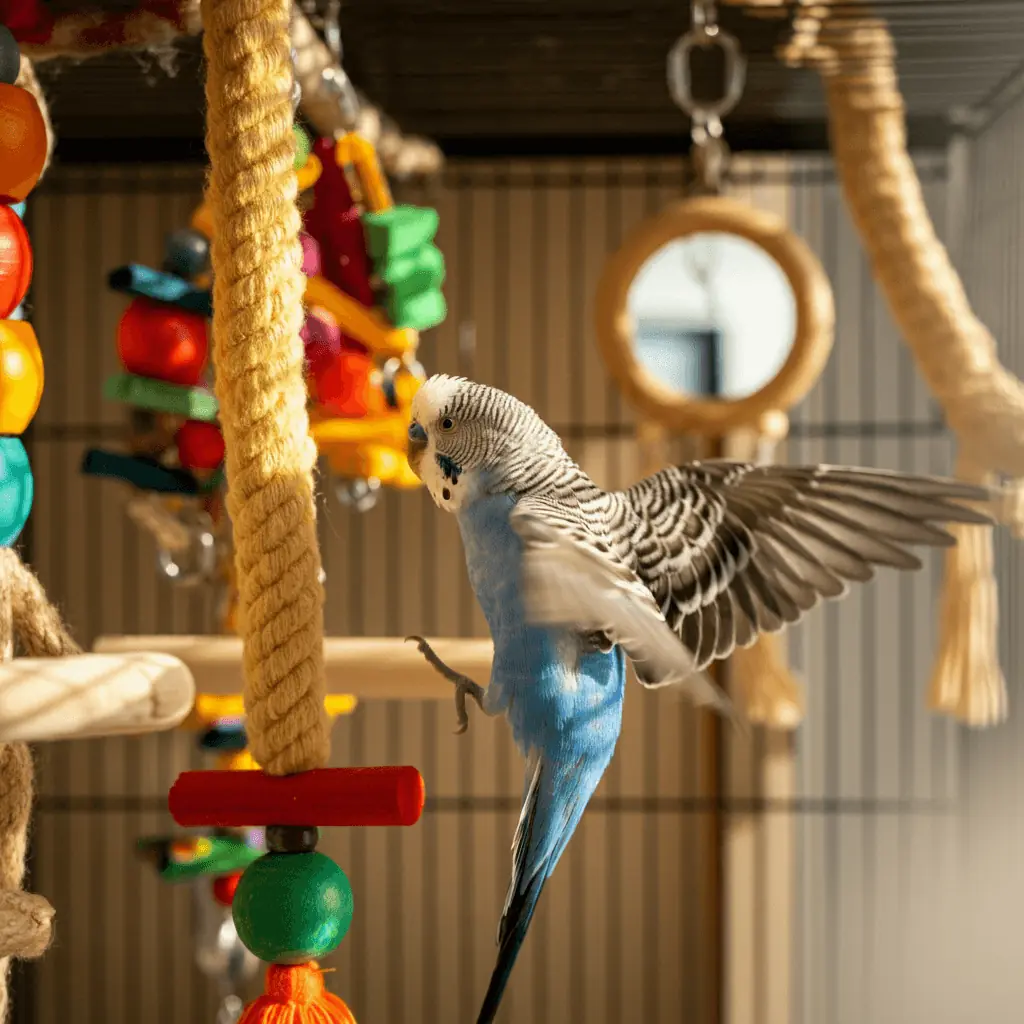
A budgerigar flying in a cage filled with colorful toys and perches, creating a stimulating environment to prevent feather plucking.
2. Maintain a Balanced Diet
A poor diet can lead to feather problems, so it’s essential to feed your budgie a balanced diet. In addition to seeds, include fresh fruits, vegetables, and pellets to ensure they’re getting the necessary nutrients for healthy feathers. Foods rich in Vitamin A, like carrots and leafy greens, promote healthy skin and feathers, reducing the risk of irritation and plucking.
3. Create a Calming Environment
Budgies are sensitive to stress, and a chaotic environment can trigger feather plucking. Make sure your budgie’s cage is placed in a calm, low-traffic area of your home. Avoid exposing your bird to loud noises, sudden changes, or frequent disturbances. Providing a stable and comfortable environment will keep your budgie at ease.
4. Regular Grooming and Hygiene
Keeping your budgie clean and well-groomed can help prevent feather plucking. Offer regular baths to help them manage their feather health and avoid irritations. Bathing helps reduce itchiness and keeps their feathers in top condition. You can use a shallow dish of water or a spray mist to encourage bathing.
5. Address Health Issues Promptly
If you suspect your budgie is plucking feathers due to skin irritation, mites, or any other health issue, consult an avian vet immediately. Early intervention can prevent the problem from escalating. Regular check-ups are also essential to catch potential health problems before they lead to plucking.
6. Provide Social Interaction
Budgies are social birds that thrive on companionship. If your bird is often left alone, it might develop anxiety or loneliness, leading to feather plucking. Spend time interacting with your budgie daily, or consider getting a second bird to keep them company. Having a buddy around can alleviate stress and provide the social interaction they crave.
7. Use Natural Lighting and Proper Sleep
A regular sleep schedule and exposure to natural sunlight help regulate your budgie’s hormones, reducing the chances of hormonal imbalances that can lead to feather plucking. Make sure your bird gets 10-12 hours of undisturbed sleep in a quiet, dark space each night.
By incorporating these strategies into your budgie’s daily routine, you can create an environment that reduces stress, improves feather health, and prevents the development of harmful behaviors like feather plucking.
Identifying Early Signs of Feather Plucking
Catching feather plucking early is key to preventing long-term damage to your budgie’s feathers and health. Being able to identify the early signs of feather plucking will allow you to take quick action and address the underlying issues before they escalate.
1. Unusual Preening Habits
Budgies naturally preen their feathers to keep them clean and well-maintained. However, if you notice your bird obsessively preening, particularly focusing on one area of its body, this could be an early sign of feather plucking. Keep an eye out for repetitive movements and excessive preening that lasts longer than usual.
2. Missing or Damaged Feathers
One of the most obvious signs of feather plucking is finding missing or damaged feathers. If your budgie has bald spots or its feathers appear frayed or broken, it could indicate that your bird has started plucking. Check under their wings, chest, and tail for areas where feathers are thinning or missing entirely.
3. Irritated Skin or Redness
Feather plucking can lead to irritated skin, causing redness, sores, or scabs where the feathers have been pulled out. If you notice your budgie’s skin looking inflamed or if they are scratching themselves more than usual, it’s a signal that something is wrong and needs to be addressed.
4. Increased Nervousness or Anxiety
A stressed or anxious budgie may start feather plucking as a way to cope with their emotions. If your bird seems more jumpy, aggressive, or withdrawn than usual, it could be feeling stressed. This behavioral shift often accompanies feather plucking, so watch for signs of anxiety or restlessness in your bird’s demeanor.
5. Feather Picking During Downtime
Feather plucking often occurs when a budgie is alone or has little to do. If you notice your bird plucking when it’s supposed to be resting or during quiet moments, it might be a sign of boredom or loneliness. Pay attention to when your budgie engages in plucking behavior, especially if it happens during times of inactivity.
6. Vocalizing or Displaying Frustration
Sometimes, feather plucking is accompanied by vocal signs of distress. If your budgie is chirping more frantically, making unusual noises, or showing signs of frustration, it could indicate that something is bothering them—possibly leading to feather plucking.
Recognizing these early signs of feather plucking allows you to take proactive steps to stop the behavior before it worsens. Whether it’s addressing boredom, anxiety, or a health issue, acting quickly will help ensure your budgie stays healthy and its feathers remain intact.
Effective Treatments for Budgerigar Feather Plucking
Treating budgerigar feather plucking effectively requires a combination of addressing both the behavioral and physical causes. By taking the right steps, you can help your budgie regain its feather health and prevent further damage. Here are some of the most effective treatments for budgerigar feather plucking:
1. Increase Mental Stimulation
One of the leading causes of feather plucking is boredom. To treat this, you need to keep your budgie mentally engaged. Introduce a variety of toys, puzzles, and activities that challenge your bird’s mind. Rotating toys frequently and allowing your budgie to explore new objects can make a big difference. You can also provide foraging toys that encourage natural behaviors, reducing the urge to pluck feathers.
2. Improve Diet and Nutrition
A balanced diet plays a vital role in treating feather plucking. Ensure your budgie is eating a diet that includes fresh fruits, vegetables, and high-quality pellets in addition to seeds. Nutrient-rich foods, especially those high in Vitamin A, calcium, and protein, are essential for healthy feathers. If your budgie has nutritional deficiencies, it can lead to poor feather health and increase the likelihood of plucking.
3. Address Skin Irritation and Parasites
If feather plucking is caused by skin irritation or parasites like mites, you need to treat the underlying issue immediately. Consult an avian vet to check for skin infections or parasites and follow their advice on treatments. Your vet may recommend topical creams, medications, or other treatments to relieve itching and discomfort that lead to plucking.
4. Reduce Stress and Anxiety
Stress is another major trigger for feather plucking. Create a calm, stable environment for your budgie by avoiding loud noises, sudden movements, or frequent changes to their living space. If your bird is prone to anxiety, try to maintain a consistent routine to help them feel more secure. In some cases, providing a calming supplement, under your vet’s guidance, can help ease anxiety.
5. Ensure Proper Sleep and Natural Lighting
Budgies need 10-12 hours of uninterrupted sleep each night to stay healthy. Lack of sleep can lead to stress and behavioral problems, including feather plucking. Make sure your bird’s cage is in a quiet, dark room during sleep time. Exposing your budgie to natural light during the day helps regulate their hormonal cycles, which can also reduce feather plucking related to hormonal imbalances.
6. Social Interaction and Bonding
Budgies are highly social birds, and loneliness or lack of attention can trigger feather plucking. Spend time with your bird each day, talking to them, playing, or letting them perch on you. If you have a single budgie, consider getting a second bird for companionship, as they often thrive with a buddy. However, introducing another bird should be done carefully to avoid additional stress.
7. Consult an Avian Vet
If the feather plucking persists despite your best efforts, it’s essential to consult a qualified avian vet. They can perform a thorough examination to rule out any medical issues, such as infections, allergies, or hormonal imbalances, that may be contributing to the behavior. Your vet can also recommend specific treatments or behavior modification techniques tailored to your bird’s needs.
By implementing these treatments and working closely with your budgie, you can help them overcome feather plucking and return to a healthy, happy lifestyle. Patience and consistency are key, as it may take time to see improvements, but with the right approach, you’ll be able to restore your budgie’s feather health and well-being.
The Importance of a Stimulating Environment for Your Budgerigar
Creating a stimulating environment for your budgerigar is one of the most effective ways to prevent feather plucking and other behavioral problems. Budgies are intelligent, curious birds that thrive when they have plenty to explore and engage with. A lack of mental and physical stimulation can quickly lead to boredom, stress, and destructive behaviors, including feather plucking. Here’s why a stimulating environment is so important for your budgie’s well-being.
1. Prevents Boredom and Feather Plucking
Boredom is one of the leading causes of feather plucking in budgerigars. Without enough mental and physical stimulation, your budgie may turn to plucking as a way to pass the time. Providing a variety of toys, such as mirrors, bells, and foraging puzzles, can help keep your bird entertained. Rotating toys regularly ensures that your budgie always has something new to discover, keeping their mind active and engaged.
2. Encourages Natural Behaviors
A stimulating environment allows your budgie to engage in natural behaviors like foraging, climbing, and flying. Incorporating items like ladders, swings, and chew toys into their cage mimics activities they would naturally do in the wild. Foraging toys, where your budgie has to search for food, keep them mentally sharp while satisfying their instinct to explore and hunt.
3. Reduces Stress and Anxiety
A dull, unstimulating environment can lead to stress and anxiety, both of which are common triggers for feather plucking. By giving your budgie opportunities to interact with their surroundings and keeping their environment varied, you reduce the chances of them becoming stressed. Budgies with a stimulating environment are more likely to be calm and content, reducing the likelihood of destructive behaviors.
4. Promotes Physical Health
Budgerigars need physical activity to stay healthy. A stimulating environment encourages movement, whether it’s flying around the cage, climbing, or playing with toys. Exercise is not only good for their muscles and bones but also helps maintain healthy feathers. Birds that are physically active are less likely to experience feather plucking due to inactivity or frustration.
5. Builds Bonding and Social Interaction
Budgies are social animals and need interaction to stay happy. A stimulating environment doesn’t just include toys and perches—it also means spending time with your bird. Talk to your budgie, play with them, and let them out of their cage for supervised exploration. If possible, consider getting a second bird to provide companionship and prevent loneliness, which can lead to feather plucking.
6. Encourages Proper Rest and Recovery
While it’s important to keep your budgie’s environment stimulating, they also need proper rest. Ensure their cage is in a quiet area at night where they can sleep undisturbed. A well-rested budgie is less likely to develop stress-related behaviors, including feather plucking.
In conclusion, a stimulating environment is crucial for maintaining your budgerigar’s mental and physical health. By offering them a variety of toys, interactions, and activities, you create a space where they can thrive, significantly reducing the risk of feather plucking and other behavioral issues.
Consulting a Vet: When to Seek Professional Help
While minor behavioral issues can often be addressed at home, there are times when budgerigar feather plucking requires professional intervention. Feather plucking can sometimes be a symptom of a more serious underlying health problem, so it’s essential to know when to consult an avian vet.
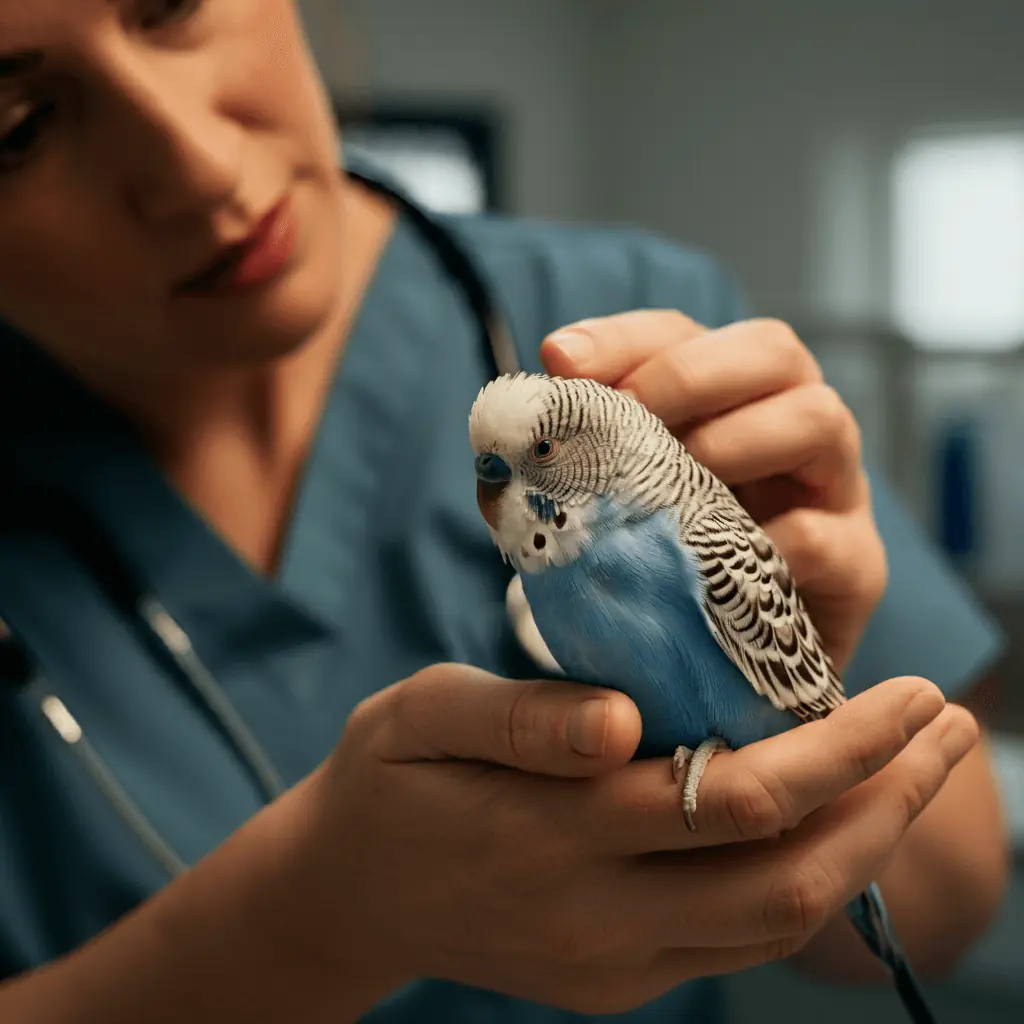
A veterinarian checking a budgerigar for health issues that may be causing feather plucking, highlighting the importance of seeking professional help.
1. Persistent or Severe Feather Plucking
If your budgie’s feather plucking is ongoing and shows no signs of improvement, despite your efforts to provide stimulation, proper nutrition, and a calm environment, it’s time to seek professional help. Persistent plucking can lead to serious skin damage, infections, or even permanent feather loss. A vet can help determine if a medical condition is causing the behavior or if additional behavioral treatments are needed.
2. Visible Skin Irritation or Open Wounds
If your budgie’s feather plucking has led to irritated skin, sores, or open wounds, consulting a vet is crucial. Skin damage can lead to infections, which could become life-threatening if left untreated. Your vet may prescribe topical treatments or antibiotics to help heal the skin and reduce your budgie’s discomfort, which could be contributing to the feather plucking.
3. Sudden Onset of Plucking
If your budgie suddenly starts plucking its feathers after previously showing no signs of this behavior, this could indicate a health issue that requires immediate attention. Sudden feather plucking can be caused by a range of factors, from parasites and skin infections to stress and hormonal imbalances. Your vet can conduct tests to rule out medical conditions and recommend treatments based on the root cause.
4. Signs of Mites or Parasites
Feather plucking caused by mites or other parasites is another situation where a vet’s help is needed. If you notice your budgie scratching frequently, or if you can see signs of tiny mites on their feathers or skin, a vet will need to perform a thorough examination. They can prescribe medication to eliminate parasites and offer advice on cleaning and disinfecting your bird’s environment to prevent future infestations.
5. Changes in Behavior or Appetite
Feather plucking often accompanies other signs of illness or distress, such as changes in your budgie’s behavior, appetite, or droppings. If your budgie becomes lethargic, stops eating, or shows signs of depression, it’s critical to consult a vet. These changes can indicate that a health issue is contributing to the feather plucking and requires prompt medical attention.
6. Hormonal Imbalances
In some cases, hormonal changes can trigger feather plucking, especially during breeding season. If your bird’s feather plucking coincides with hormonal shifts, a vet can provide treatments to help manage these changes. They may recommend adjusting your budgie’s lighting schedule or using hormonal treatments to alleviate the symptoms.
Consulting a vet is essential when feather plucking escalates beyond a mild behavioral issue. Early intervention can prevent long-term damage and help your budgie return to a happy, healthy life. By working with a professional, you’ll be able to address any medical concerns and create an effective treatment plan tailored to your bird’s specific needs.
Frequently Asked Questions About Budgerigar Feather Plucking
Budgerigar feather plucking can be a confusing and worrying behavior for bird owners. To help you better understand this issue, here are answers to some of the most frequently asked questions about budgerigar feather plucking:
1. Why is my budgie plucking its feathers?
Feather plucking in budgerigars can occur for various reasons, including boredom, stress, poor diet, skin irritation, or health problems. It’s important to assess your bird’s environment, diet, and overall well-being to determine the cause. If the behavior persists, consulting a vet is recommended to rule out medical issues.
2. Can feather plucking be stopped?
Yes, feather plucking can be stopped, but it often requires addressing the underlying cause. If it’s due to boredom or lack of mental stimulation, adding toys, social interaction, and activities can help. If the plucking is caused by health problems or skin irritation, medical treatment may be needed. Early intervention is key to success.
3. Is feather plucking painful for budgies?
Feather plucking can lead to discomfort, and in severe cases, it can cause pain. Continuous plucking may result in irritated or broken skin, which can become painful and even infected. That’s why it’s important to address feather plucking as soon as you notice it to prevent further harm to your bird.
4. Can a poor diet cause feather plucking in budgies?
Yes, a poor diet can contribute to feather plucking. Budgies need a balanced diet rich in vitamins, minerals, and proteins to maintain healthy feathers. Nutritional deficiencies, particularly in Vitamin A, can lead to poor feather health and skin problems, which may trigger plucking.
5. How can I keep my budgie entertained to prevent feather plucking?
Keeping your budgie mentally stimulated is one of the best ways to prevent feather plucking. Provide a variety of toys, such as foraging puzzles, mirrors, and bells, and rotate them regularly. Spend time interacting with your bird, talking to them, and allowing them to fly outside the cage in a safe space. Social interaction and mental stimulation are key to a happy budgie.
6. When should I take my budgie to the vet for feather plucking?
You should consult a vet if your budgie’s feather plucking persists despite your efforts to address the issue, or if you notice skin irritation, sores, or a sudden onset of plucking. Additionally, if the plucking is accompanied by changes in behavior, appetite, or droppings, professional help is needed to rule out any underlying health problems.
7. Can budgies grow back plucked feathers?
In most cases, budgies can regrow feathers that have been plucked, as long as the feather follicle hasn’t been permanently damaged. Once the plucking behavior is addressed and the bird’s health is restored, the feathers should gradually regrow. However, in cases of severe or chronic plucking, some feathers may not return.
8. Can feather plucking be a sign of stress?
Yes, stress is one of the leading causes of feather plucking in budgies. Environmental changes, loud noises, lack of social interaction, or a chaotic home environment can all contribute to your bird feeling stressed, which may result in feather plucking as a coping mechanism.
By understanding the answers to these common questions, you can take the necessary steps to prevent and address feather plucking in your budgerigar. Always monitor your bird’s behavior closely and consult a vet if the plucking persists or worsens.
Conclusion
Budgerigar feather plucking is a behavior that, while concerning, can often be managed with the right approach. Understanding the root causes—whether it’s boredom, stress, poor diet, or an underlying health issue—is key to preventing and treating feather plucking in your budgie. By providing a stimulating environment, maintaining a balanced diet, and addressing any potential health concerns, you can significantly reduce the chances of this behavior developing.
If your budgie’s feather plucking persists despite your best efforts, consulting an avian vet is crucial. Early intervention can prevent long-term damage and help restore your bird’s health and happiness. With a little patience and the right care, you can ensure your budgie lives a comfortable and feather-healthy life.
Feather plucking doesn’t have to be a permanent problem. By understanding its causes and taking proactive steps, you’ll be able to provide your budgerigar with the care and attention they need to thrive.

